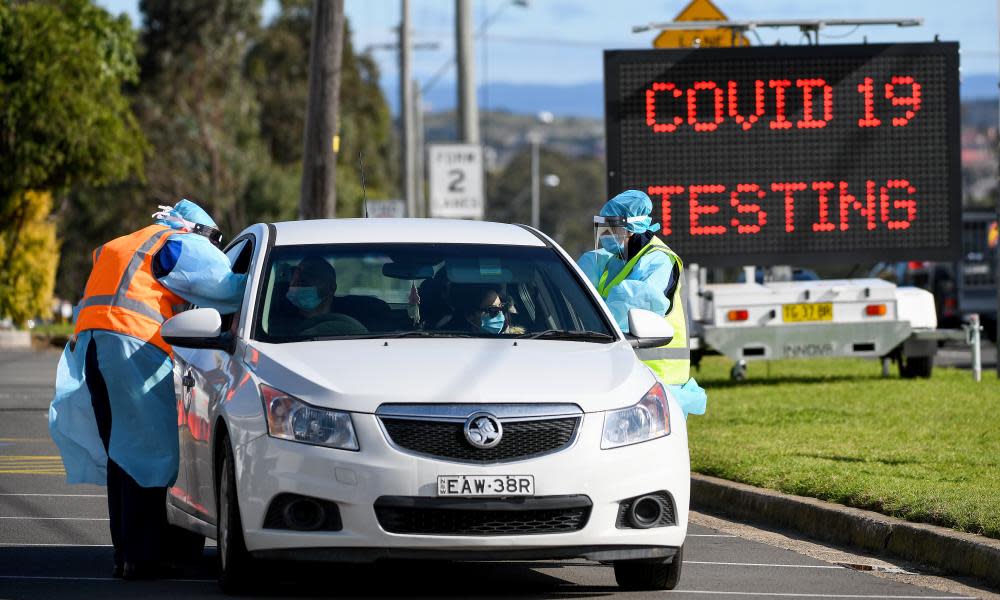Covid-19 cases will need to keep rising in NSW before restrictions are tightened, experts say

Coronavirus cases in New South Wales will need to continue rising at their current rates until at least the middle of next week before the government will consider further tightening social restrictions, public health experts have said.
They argue the state’s capacity to rapidly respond to new cases has not yet been overwhelmed.
As the cluster linked to the Crossroads Hotel in Sydney’s south-west grew to 40 cases on Thursday, the NSW chief health officer, Dr Kerry Chant, would not be drawn on specifics in relation to potential further restrictions.
But she stressed authorities were not complacent about the challenge of “mopping up” seeding of the virus from the current clusters and people who had returned from Victoria.
“I cannot stress the criticality of the current time,” Chant said when announcing contact tracers would begin re-interviewing Covid-19 positive cases who weren’t able to be linked to a source of transmission based on their first interview.
“Obviously we are concerned when we find cases that can’t be linked back because it does indicate we have missed a chain.”
Chant also announced that in addition to genomic testing – which allowed authorities to confirm the “patient zero” of Sydney’s latest outbreak had come from Melbourne – sewage analysis would be used to detect the virus in areas of Sydney previously thought Covid-19-free.
There were 15 new cases announced in NSW on Thursday morning, 10 of which were community transmissions, with six linked to the Crossroads Hotel. At least 21 of the 40-plus cases in the cluster were hotel patrons, with onward transmission occurring at nearby gyms and at restaurants as far away as Brighton-Le-Sands, 25km east of the hotel.
The NSW premier, Gladys Berejiklian, said on Wednesday that NSW would consider “further restrictions” but not lockdowns for “any activity which is high risk”.
“The health advice tells us indoor events ... we know what is high risk,” Berejiklian said, a day after announcing marshals would enforce restrictions at all hotels and pubs in the state which would be limited to 300 patrons based on the one person per four square metre rule.
Marylouise McLaws, a professor of epidemiology at the University of NSW, said the emergence of pubs and restaurants as sources of transmission in the NSW cluster demonstrated how conducive indoor environments were to spreading Covid-19.
Related: Australia's Covid-19 face mask advice: can I reuse them, what's the best to use and where to buy?
However, she believes NSW will have to record 100 community transmissions over a 14-day period – when contact tracers and hospitals are nearing their rapid-response capacity – to warrant tighter restrictions being put in place. She believes this trend will be clearer by Tuesday.
McLaws said by then there would be data for two incubation periods following the first spread of the virus at the Crossroads Hotel which would show whether there was potentially a second generation.
“It’s not as easy ring-fencing a hotspot or a suburb, like what was seen with the public housing outbreaks in Melbourne,” she said.
“That was residential, but we’re seeing social venues, pubs and restaurants, now attracting people who live all over Sydney.”
McLaws said the current limit of up to 300 people allowed in some venues was “a lot of people” given alcohol can affect their ability to adhere to distancing measures, but said noted “the numbers aren’t telling me yet it’s necessary to decrease gathering limits”.
Robert Booy, a professor of infectious diseases at the University of Sydney, also argued growing infections in NSW did not justify increased restrictions yet.
“Having hundreds of people in pubs is literally dangerous. When people are drinking they’re likely to mingle and that’s a real concern ... but what’s really hard is to keep balance between society functioning and our health.”
Booy said restrictions should not have to be tightened if indoor gathering rules – including keeping 1.5 metres between patrons – were strictly observed.
However, he conceded it would take “weeks not days” to see the impact of newly tightened rules on pubs introduced this week and how people responded to news coverage of the current outbreak.
“I don’t think we should be making decisions based on two or three days of experience. We have to be considering the long term.”

 Yahoo News
Yahoo News 